Lucille Clifton
song at midnight
In strength and defiance, Lucille Clifton celebrates her Black body and her survival. When have you said or heard words like this?
Calling herself “both nonwhite and woman,” Lucille Clifton glories in her shape and fact of her life in these two poems. She invites the reader to witness everything she’s lived through, and to celebrate the flourishing life that she has created in spite of everything that has tried to kill her.
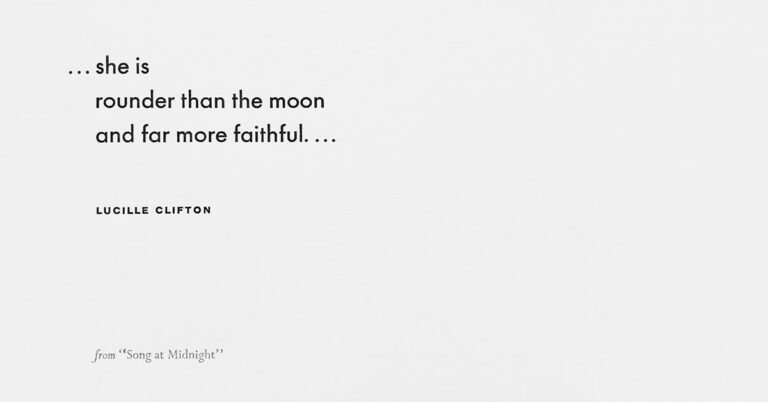
Image by Expedition Press/Expedition Press, © All Rights Reserved.
Guest
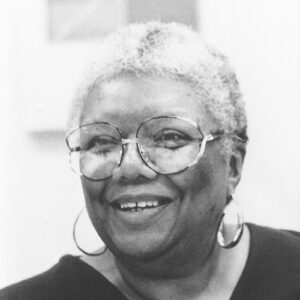
Lucille Clifton was the author of several books of poetry including Blessing the Boats: New and Selected Poems 1988–2000, which won the National Book Award, The Book of Light, and Good Woman: Poems and a Memoir 1969-1980. She served as poet laureate for the state of Maryland from 1979-1985 and was a distinguished professor of humanities at St. Mary’s College of Maryland. She died in 2010.
Transcript
Pádraig Ó Tuama, host: My name is Pádraig Ó Tuama, and poetry is a fairly solitary art. While it can, sometimes, get shared in books or in readings, mostly poems are written by a person, alone, with a computer or with a pen or a pencil. And that can be lonely, but, also, it can be a magnificent way to find a language that suits yourself, in those alone hours, maybe in the morning, maybe late at night. But, in so doing, you can find a language for yourself that can help you survive.
[music: “Praise the Rain” by Gautam Srikishan]
Ó Tuama: “song at midnight” by Lucille Clifton. This poem has an epigraph at the beginning: “…do not send me out / among strangers” from Sonia Sanchez.
“brothers,
this big woman
carries much sweetness
in the folds of her flesh.
her hair
is white with wonderful.
she is
rounder than the moon
and far more faithful.
brothers,
who will not hold her,
who will find her beautiful
if you do not?
won’t you celebrate with me
what i have shaped into
a kind of life? i had no model.
born in babylon
both nonwhite and woman
what did i see to be except myself?
i made it up
here on this bridge between
starshine and clay
my one hand holding tight
my other hand; come celebrate
with me that everyday
something has tried to kill me
and has failed.”
[music: “What Did You Not Hear” by Gautam Srikishan]
Ó Tuama: Well, Lucille Clifton was on my list for this season; in fact, she’s probably on my list for every season. Her work is extraordinary. She has such an interesting style. She doesn’t use any capital letters, and her poems are always short and so distilled. They are beautiful, and they know what they’re doing. They are so intelligent and clear; they don’t get in their way, and they are filled with their own music, which is a music of power and precision.
This poem is a poem of two halves, really. And sometimes they’re used separately. The first one is called “song at midnight.” The second one is untitled but comes right after it, and so, sometimes they’re seen as two halves of one poem and, other times, seen to operate separately. Lucille Clifton was in her late 50s when this poem was published in The Book of Light in 1992. And the epigraph she uses from Sonia Sanchez is from a poem called “Poem at Thirty.” And so there’s such an interesting thing about being a woman, being an African-American woman, and being an African-American woman who states her age that, I think, is really interesting, happening in this poem. And the first half is inviting a gaze on her body, the “big woman” she speaks about. She speaks about “the folds of her flesh,” and then she says, “her hair / is white with wonderful.” And I love that “wonderful” is just this noun. It is this being. Rather than it describing anything, it is its own thing; and she is it, with “wonderful.”
Then she continues to go on to describe shape: she reclaims words that would be, I suppose, in the mind of some people who want to be derogatory about other people’s body shape, that would be derogatory, which shouldn’t be. She says, “she is / rounder than the moon / and far more faithful.” She takes that word “round” and weaves it into something, to say, “Keep on looking, and let me define who and what you’re looking at in a way that arrests any imagination that will be derogatory.”
So often, people are used to being disempowered in how they’re observed, and Lucille Clifton lived a very difficult life, and she survived with tremendous power. And she defined her own terms. She did not live a life of luxury. She had been evicted a few times, and she speaks of the difficulty of all of that. And she is inviting what the gaze should be, having lived a life that would have been observed through a gaze of judgment, for all kinds of things, and she is redefining and reclaiming, and in a way with great precision and music, dictating what the imagination of the gaze towards her should be.
[music: “Keo Keo” by Blue Dot Sessions]
Ó Tuama: The intuition of this poem is that survival is not enough. And even powerful surviving, and thriving — thriving alone and flourishing alone isn’t enough. She is inviting people into a new way of imagining flourishing, where they recognize everything that she’s lived through, and they see that as a celebration, see that as beautiful, see that as worthy of touch and sensuality and holding, because she knows it is. She’s not asking for pity or charity, to be included; she’s already included, and she’s inviting people into this new economy of observing the body, the physicality of the body and every way within which that body has had to survive, in light of systems that would have tried to annihilate that body.
And I think that that is so meaningful and powerful. Coming from very far away and being Irish, who looks at the impact of Irish migration overseas and the racist history of Irish people overseas, as well, I find myself strangely moved and guiltily moved, really, that Lucille Clifton has written something that’s so generous. Because — so I see myself in this poem, as a white man, and I see myself as a white man listening to this and realizing that me, and people who look like me, especially men who look like me, are the ones who are being appealed to listen to the voice of this Black woman speaking to us — and by “us,” I mean men like me — and listen and pay attention and to reform our eyes and to reform our imagination about what it means to recognize the power present in this person, in her body and in her survival.
[music: “White Filament” by Blue Dot Sessions]
Ó Tuama: I think she counteracts control, in terms of how it’s been handed down through patriarchy, with a powerful imagination about what community is. She speaks to people, “brothers,” in terms of a familial way; she’s imagining that the people who have wronged her in their gaze towards her are brothers. And that is both a challenge, but it’s also a familial invitation. Her imagination about what’s on the other side of this is one of human connection, rather than just turning the tables of dominance. And then she moves from addressing brothers to addressing people; to say, celebrate with me. So her counteraction to a system that would have sought to annihilate her and cast her away, both in appearance as well as in her survival, is to imagine both family and celebration. That is a remarkable usage of power. It is powerful. It isn’t just accepting the middle ground; it isn’t anything limpid. This is muscular and brilliant, in terms of what it imagines on the other side of repair.
[music: “First Grief, First Air” by by Gautam Srikishan]
Ó Tuama: There are so many postures in this poem that you can imagine yourself being drawn in through. One of them is that this poem might register in yourself, and you might feel like, Yeah, this is a song, too, that I would sing at midnight, and maybe it’s a song that I’d like to sing throughout the day. The “song at midnight” implies that she’s singing it to herself, first, and wishes it to be expanded into the community, during the daytime. Also, it’s a song at midnight during the great comfort of the dark.
But then there’s another posture in this: What if you’re one of the people who looks on others and does not see them beautiful? What if you’re one of the people who’s part of the thing that has tried to kill others? This poem is to comfort some and to challenge others, and maybe to comfort some part of us and to challenge some part of us. And I think that’s the great brilliance of this “song at midnight” is to say, what would it be like, for you to imagine this song for yourself, and what would it be like to imagine that this song is sung to you and that you are being drawn into something new?
[music: “At Dusk” by by Gautam Srikishan]
“Song at Midnight” by Lucille Clifton — this poem opens up with an epigraph from Sonia Sanchez: “…do not send me out / among strangers”
“brothers,
this big woman
carries much sweetness
in the folds of her flesh.
her hair
is white with wonderful.
she is
rounder than the moon
and far more faithful.
brothers,
who will not hold her,
who will find her beautiful
if you do not?
won’t you celebrate with me
what i have shaped into
a kind of life? i had no model.
born in babylon
both nonwhite and woman
what did i see to be except myself?
i made it up
here on this bridge between
starshine and clay
my one hand holding tight
my other hand; come celebrate
with me that everyday
something has tried to kill me
and has failed.”
[music: “Praise The Rain” by by Gautam Srikishan]
Lily Percy: Excerpts from “song at midnight” comes from Lucille Clifton’s The Book of Light. Thank you to the Permissions Company, on behalf of Copper Canyon Press, who gave us permission to use Lucille’s poem. Read it on our website at onbeing,org.
Poetry Unbound is Chris Heagle, Erin Colasacco, Serri Graslie, Eddie Gonzalez, Lilian Vo, Christiane Wartell, Karen Navarre, Karyn Towey, Sue Ariza, and me, Lily Percy. Our music is composed and provided by Gautam Srikishan and Blue Dot Sessions. This podcast is produced by On Being Studios, which is located on Dakota land. We also produce other podcasts you might enjoy, like On Being with Krista Tippett, Becoming Wise, and This Movie Changed Me — find those wherever you like to listen or visit us at onbeing.org to find out more.
Books & Music
Recommended Reading
The On Being Project is an affiliate partner of Bookshop.org and Amazon.com. Any earnings we receive through these affiliate partnerships go into directly supporting The On Being Project.






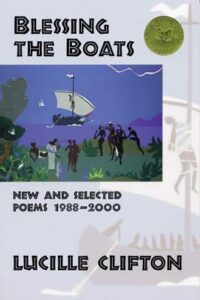
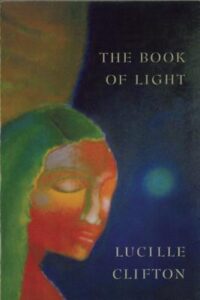
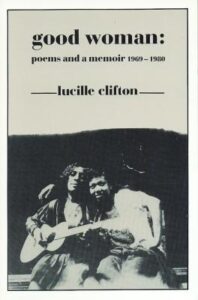

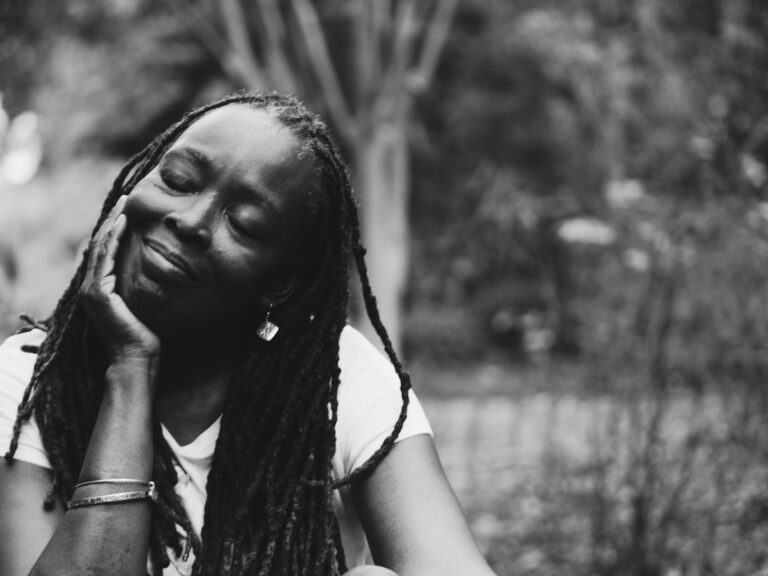
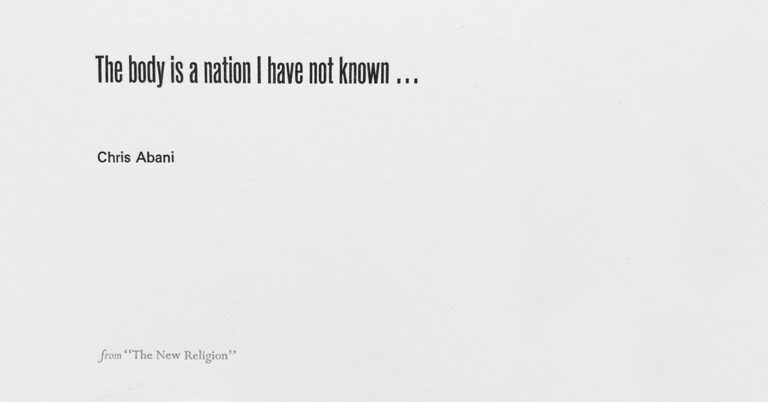
Reflections